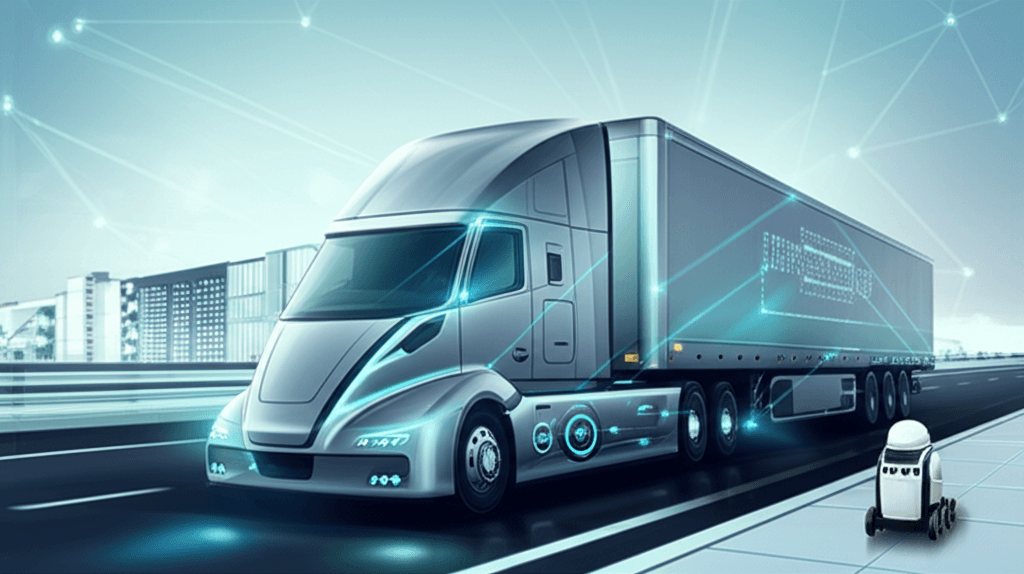Logistics Revolution: AI Partnerships Scale Autonomous Delivery Beyond Pilots
Strategic alliances with manufacturing and logistics giants are propelling AI-powered autonomous delivery to widespread commercialization.
June 24, 2025

The landscape of logistics and delivery is undergoing a seismic shift, driven by advancements in artificial intelligence and robotics. Companies specializing in AI-powered self-driving delivery vehicles are moving beyond pilot programs and entering a new phase of scaled operations. This transition is largely facilitated by strategic partnerships that pair technology developers with established manufacturing and logistics giants. These collaborations are proving essential for navigating the complexities of mass production and fleet management, signaling a pivotal moment for the autonomous vehicle industry and the future of supply chains. By leveraging the expertise of experienced manufacturers, AI firms can implement flexible and scalable production lines, a critical step in meeting the growing demand for autonomous delivery solutions.
A key trend accelerating the deployment of autonomous trucks is the formation of synergistic partnerships between AI technology firms and established industry players. For instance, Canadian autonomous trucking company Waabi has entered into a significant 10-year agreement with Uber Freight to deploy AI-powered trucks.[1][2] This partnership combines Waabi's "Waabi Driver" technology—comprising software, sensors, and hardware—with Uber Freight's extensive logistics network.[1][2] The collaboration aims to offer a "driver-as-a-service" model, allowing carriers to integrate autonomous trucks into their operations seamlessly.[1] The initial phase of this partnership has already seen commercial loads transported between Dallas and Houston, with plans to expand to other routes.[2][3] This "turnkey" solution is designed to address pressing industry challenges like the driver shortage and the high percentage of miles driven empty, which is estimated to be between 20-35%.[1] Similarly, Kodiak Robotics has partnered with the global shipping leader Maersk to establish a commercial autonomous trucking lane between Houston and Oklahoma City.[4] This service operates 24/7, with Kodiak trucks hauling eight loads per week for Maersk customers.[4] These alliances demonstrate a powerful model for scaling, where the AI developer provides the core autonomous technology and the logistics partner offers the network, customer base, and operational expertise to deploy it effectively.[2][5][6]
The transition from prototype to mass production is a formidable challenge for any autonomous vehicle company, necessitating expertise in complex manufacturing and assembly. To overcome this hurdle, AI firms are increasingly turning to contract manufacturing partners. Kodiak Robotics, for example, has selected Roush Industries, a company with nearly five decades of mobility industry experience, to scale the production of its autonomous trucks.[7][8] Starting in the second half of 2025, Roush will upfit trucks with Kodiak's modular hardware, including its proprietary SensorPods and AI compute systems, at a dedicated facility in Michigan.[7][8] This partnership is designed to create a flexible manufacturing process capable of scaling to meet rising demand, a crucial step for commercial deployment.[7] In the last-mile delivery sector, robotics company Cartken has partnered with Magna, a global automotive supplier, to manufacture its fleet of autonomous delivery robots.[9] This collaboration, which began at a Magna facility in Michigan, is expected to produce thousands of robots and will expand to include additional delivery models.[9] These partnerships are essential as they address the challenge of scaling hardware production, allowing the AI companies to focus on their core competency: the development and refinement of autonomous driving software.[10]
The implications of these scaling efforts extend beyond individual companies, pointing to a broader maturation of the autonomous vehicle industry. For middle-mile logistics, companies like Gatik have been making significant strides. Gatik, which focuses on fixed, repeatable B2B delivery routes, has partnered with major retailers like Walmart and Kroger.[11][12] In a landmark achievement, Gatik launched the world's first driverless commercial transportation service with Walmart in 2021.[11][12] The company has also forged strategic partnerships with industry leaders like Isuzu, Ryder, and Goodyear to support its path to commercialization at scale.[12][13] Isuzu's investment and collaboration with Gatik aim to mass-produce SAE Level 4 autonomous trucks, integrating the technology directly into the vehicle manufacturing process.[14] This integrated approach differs from retrofitting existing trucks and is seen as key to achieving safe and efficient operations at a large scale.[14] Meanwhile, the sidewalk delivery space is also experiencing rapid growth, with companies like Serve Robotics, an Uber spin-off, deploying thousands of robots on the Uber Eats platform.[15] Coco Robotics also recently raised significant funding to scale its fleet of remotely supervised self-driving robots.[15]
In conclusion, the AI-powered autonomous delivery sector is clearly accelerating its move from research and development to widespread commercial application. The strategic alliances being forged between AI innovators and established manufacturing and logistics powerhouses are the driving force behind this scaling of operations. These partnerships provide a viable path to mass production through flexible manufacturing and offer the vast networks needed for large-scale deployment.[2][7] By combining cutting-edge AI with proven industrial expertise, companies in both the long-haul trucking and last-mile robotics spaces are overcoming critical barriers to commercialization. This collaborative approach is not only enabling individual companies to expand their fleets but is also laying the groundwork for a more efficient, automated, and interconnected supply chain, fundamentally reshaping the future of logistics.